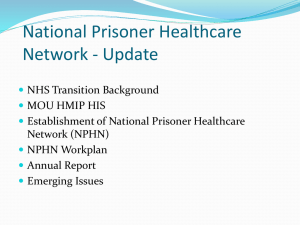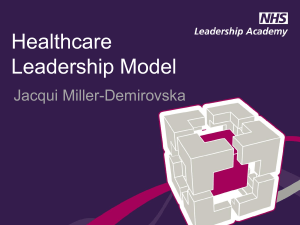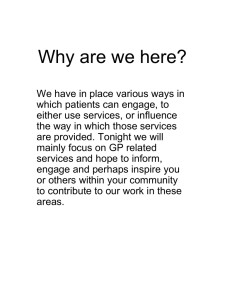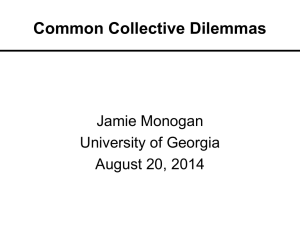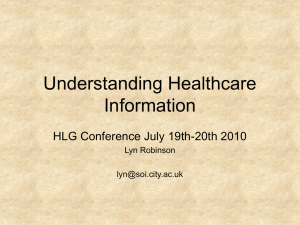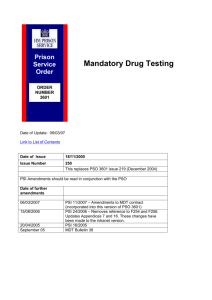John Porter - Voluntary Health Scotland
advertisement
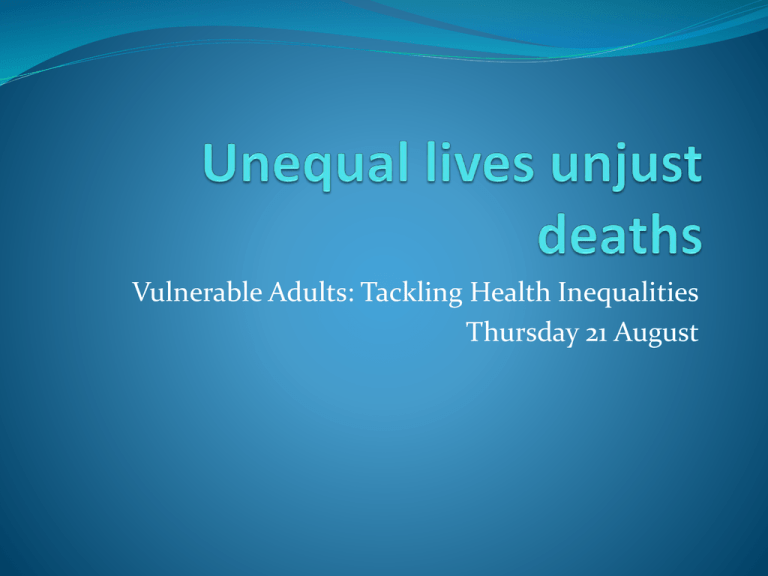
Vulnerable Adults: Tackling Health Inequalities Thursday 21 August John Porter National Lead Nurse for Prisoner Healthcare Working within HIS - responsibility to NHS Director, Health and Justice Provide support and guidance to NHS Leads responsible for Prisoner Healthcare through the National Prisoner Healthcare Network Overview National Prisoner Healthcare Network Health Profile of Prisoner 2013 Prisoner Survey Results Imprisonment Rates Alternatives to prison Opportunities and challenges Going Forward National Prisoner Healthcare Network Responsibility for primary healthcare in prison transferred from SPS to NHS Boards in November 2011. NPHN set up in November 2011 to coincide with formal transfer Membership included healthcare leads from each of the NHS Boards with representatives from SPS and other agencies including the third sector. Purpose. Initially to assist the transition of prisoner healthcare from SPS to NHS by providing a strategic and national coordinating role to support the delivery of a high quality, safe, effective and consistent services to prisoners National Prisoner Healthcare Network NPHN Workplan. Identified a number of key priority workstreams including: Mental Health Substance Misuse Information Governance Expert Advisory Group for Medicines Throughcare 2 year review Appointment of New NHS Director, Health and Justice. Senior appointment to improve health outcomes of offenders with commitment to supporting the Scottish Government Health Inequalities agenda. Scottish Inequalities Agenda The reality in Scotland is that there is a significant proportion of the population with poor health. Despite improvements we remain the “Poor man of Europe” particularly in respect of those from deprived areas A NES publication “Bridging the Gap” quotes; “In Scotland men in the 10% of 'least deprived areas' can expect on average to reach an age of 81.1 years, while men in the 10% most deprived areas who could expect to live on average 67.7 years, a gap of more than 13 years.” Health Profile of Prisoner Prisoners are likely to come from a particularly vulnerable group in society and face a wide range of health issues that are often associated with their offending behaviour. A strong indication of their life and health circumstances can be drawn from the prisoner survey the most recent being 2013 Health prevalence comparator Prevalence on admission to Prison Alcohol problems 73% Illegal Drug Use 56% Smoking Rates 76% Hepatitis C 20% Asthma 12% Epilepsy 2.1% Chlamydia 12% Severe dental decay 29% male/ 42% female Schizophrenia 9% male/ 36% female Depression 25% Personality disorders 66% approx Prevalence in the Community 12% 1.6% 24% 1% 5.4% 0.7% 0.8% 10% male/3% female 0.5% 5% approx 5% approx Prisoner healthcare in context (drawn from 2013 Prisoner Survey) The survey is conducted very two years and is sent to all those in prison across Scotland. The questions asked most pertinent to the health and lifestyle of prisoners has been analysed and a short precis of the key themes shown; 60 % of prisoners in all Scottish prisons completed the survey Information was sought in relation to alcohol consumption, substance misuse, mental well being and attitudes to support to address their offending behaviour. The highest responses were from HMP Barlinnie and HMP Inverness however the lowest was from HMYOI Polmont and the Open Estate – perhaps suggesting that they are most difficult to engage with Prisoner Survey statistics Impact of alcohol on offending behaviour Drunk at the time of committing offence 45% of all prisoners 50% of female prisoners 68% of young offenders The more often an offender has been re-imprisoned the greater the association with alcohol Prisoner Survey statistics Impact of being in “Care” as a child 30% of all female prisoners were in care as children 30% of young offenders were in care as a child Almost 2/3 of those who had been in care had witnessed violence as a child from a parent or a carer Prisoner Survey statistics Health profile of older prisoners Over 1/3 said they had a disability Nearly ½ said they had a long term illness Nearly 2/3 said they were smokers Prisoner Survey statistics Looking at the custodial history Analysis of the results showed that there was a correlation between the chaotic lifestyles of the prisoners, their alcohol and substance abuse and their offending behaviour Substances misuse increased the more often they were in prison however 2/3 said they would respond to assistance if it was offered Prisoner Survey Statistics Young Offenders - top priority for SPS Most hopeful results Important to engage with this group and help them reach their aspirations not to reoffend 90% said they thought they would have a job, a partner and a house 2 years after release 60% said they would be free from offending 2 years after release Prisoner Survey statistics Helping them to meet their desire to break their offending behaviour need to be aware that; 1/5 had difficulty reading and writing ½ were under the influence of alcohol or drugs at the time of their offence 1/3 were in care as children They expressed a desire to learn through sports, practical workshops and the internet Imprisonment Rate Scotland has one of the highest imprisonment rates in Western Europe. Overcrowding, prisoner movement, the prison regime, the relatively short time that someone spends in prison, remain very challenging issues. This creates huge challenges in relation to the detection and assessment of health problems and needs, and the delivery of integrated care, both within prison and in the transition between prison and the community. Imprisonment rate comparator Incarceration rate per 100,000 population 800 743 700 600 500 400 300 Series1 200 100 0 153 58 Prisons - model It could be argued that Prisons should be used for minority of cases for public safety Considerable financial resources spent sending people to prison - no evidence on reducing offending Potentially by shifting resources upstream and making investment more productive – to concentrate on preventative / community development / early years I look forward to further discussion on this throughout the day Opportunities Healthcare provided in prisons can be the first opportunity to receive access to health care services The transfer of prisoner healthcare to NHS Boards places greater obligation on them to provide equivalent healthcare. Greater degree of collaborative working and greater understanding between those responsible for justice and those responsible for health Opportunities Scottish Government commitment to the Reducing Reoffending Change Fund and the maintenance of Public Social Partnerships NHS Chief Executives commitment to the continuation of the National Prisoner Healthcare Network Scottish Government creation of a Director, Health and Justice – now chair of the National Prisoner Healthcare Network Opportunities Shared governance and between NHS Boards and SPS Strong collaboration between the network’s responsible for prisoner healthcare, forensic and police custody Challenges Engagement to ensure multiple agencies work together and in unison without duplication of effort. Multiple Health Boards with different approaches Need to ensure throughcare arrangements are well articulated and that prisoners are able to access vital healthcare services after release. Challenges Creating and sustaining systems and processes across multiple agencies that enable the best possible healthcare to those in and leaving prison Creating opportunities for those in the poorest of circumstances through education, employment and appropriate housing Working towards breaking the cycle of offending behaviour with particular focus on “the early years” Going forward Look forward to discussing how we collectively address the challenges and capitalise on the opportunities?
